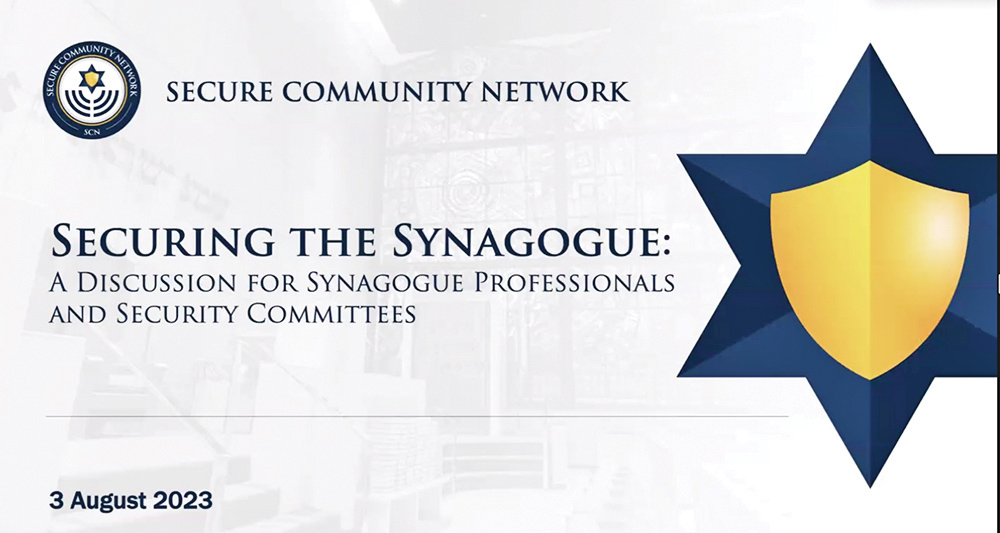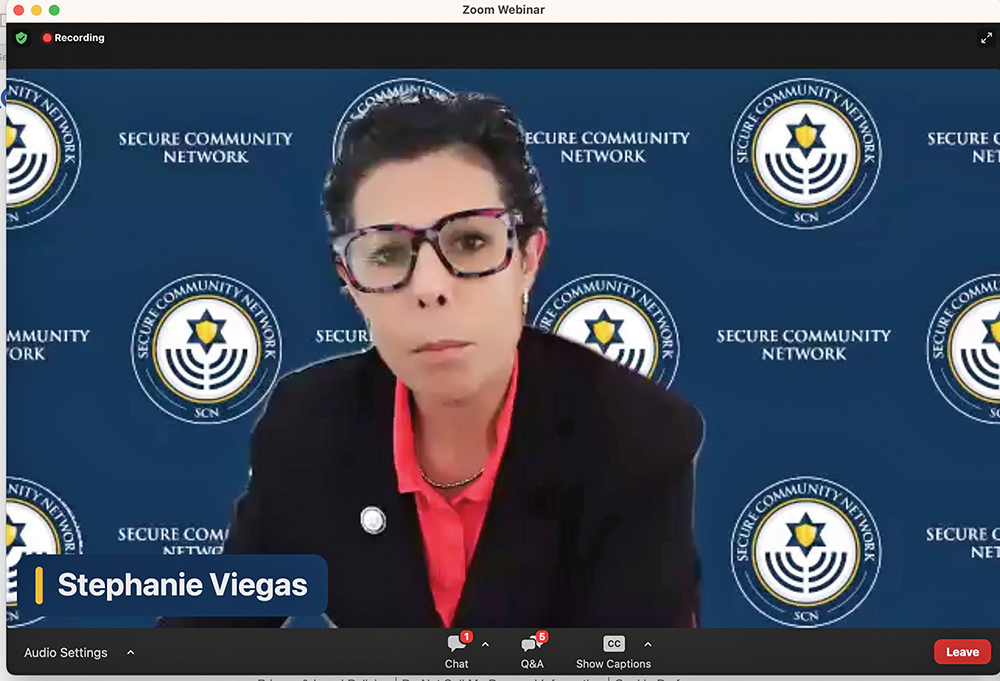
The smart leaders in our shuls don’t wait until 10 days or so before the chagim to start preparing for security during one of the community’s busiest times; they start planning many weeks earlier.
To address those smart leaders and encourage others to follow their lead, the Secure Community Network (SCN) held a Zoom webinar last week on the topic, “Securing the Synagogue: A Discussion for Synagogue Professionals and Security Committees.”
Bradley Orsini, the senior national security adviser at SCN, started the formal program by noting that the webinar was taking place as two events of high interest to Jewish community security were unfolding — the conviction and sentencing of the shooter at the Tree of Life synagogue in Pittsburgh in 2018 and the apprehension this week of an assailant at the Margolin Hebrew Academy in Memphis.
Orsini pointed out that there were three important lessons learned in the Memphis incident:
- They had a great security plan in place.
- Their access control was “top of the line,” with a”man-trap” between two sets of double locking doors.
- The school administrators had the ability to use their video surveillance system to quickly take a photo of the suspect and share it with law enforcement, which led to the prompt capture of the assailant.
Orsini stated that, as preparation for the High Holidays goes into high gear, each institution should keep in mind these four principles:
- Safety and security is the responsibility of the entire community and not just security professionals or volunteers.
- Everyone can be a first responder.
- Each organization member can assist in response to an emergency by committing to action (to either run, hide or fight).
- Never, ever dismiss signs of hatred — report, report, report!

Orsini introduced Kerry Sleeper, a senior advisor at SCN and a retired commissioner of the Vermont State Police, who sketched out the current threat environment facing the Jewish community at this time. He stated that these threats include the fact that “we are awash in social media threats to the community, every day,” and there’s an increase in displays of public expressions of hatred against Jews, often by neo-Nazis. Iran makes periodic threats against Israel and Jews worldwide, and there are “too many disturbed individuals, with access to firearms.”
Sleeper also pointed out that police departments in many places are under-resourced so they must do triage on the situations they’re called to address. He suggested that if a Jewish community can build a strong relationship with their local police department, this will help the Jewish community stay “on the radar” if a need arises.
Orsini then introduced David Wilson, deputy chief of security cooperation of the U.S. Central Command in the Greater Tampa Bay area in Florida and an adviser to SCN. Wilson spoke about the value of the incident reporting form by SCN, which is now available on many Jewish federations websites and on the SCN website (www.securecommunitynetwork.org/incidentreporting). This form includes a section where a person can request immediate assistance.
Retired FBI agent Stephanie Viegas then led the webinar and introduced three panelists: Michael Bentolila, chief of police in Aventura, Florida; vice president, Jeremy Yamin, vice president, security and operations at the Combined Jewish Philanthropies of Boston; and Meredith Burke, SCN’s community security director for Jewish Long Beach in California.
Yaymin stressed the value of reviewing the components of an organization’s physical security, communications practices, and procedures for unusual circumstances well in advance of the High Holidays. As an example, he stated that a synagogue’s security team should have one unified approach on how to report a suspicious person to law enforcement, while also advising the synagogue’s leadership team that they did so.

Bentolila urged viewers to develop strong relationships with their local police departments and regularly stay in contact. He encouraged Jewish organizations to “use your security resources as efficiently as possible,” and as an example, said that if a synagogue has security cameras, they should make sure they are all working and all their capabilities have been explored. He also suggested that synagogues create one-page questionnaires that will help a member of the security team to quickly record descriptive details about a suspicious person.
Burke discussed the importance of conducting a threat vulnerability assessment of facilities every few years and said that this report can be used in applications for federal homeland security grants. She also stressed the importance of a synagogue’s security team member calling 911 right away if they spot a suspicious activity or person; this should be followed up with advising others on the security team that they made the call and designating someone to meet the police when they arrive to check out the alert.
To watch a video recording of the seminar prepared by SCN, visit tinyurl.com/yubzx5e6.
To access the SCN documents referenced in this webinar and to register for upcoming SCN webinars, visit www.securecommunitynetwork.org/high-holidays.
Harry Glazer is the Middlesex County Editor of The Jewish Link. He can be reached at harryglazer615@gmail.com.









